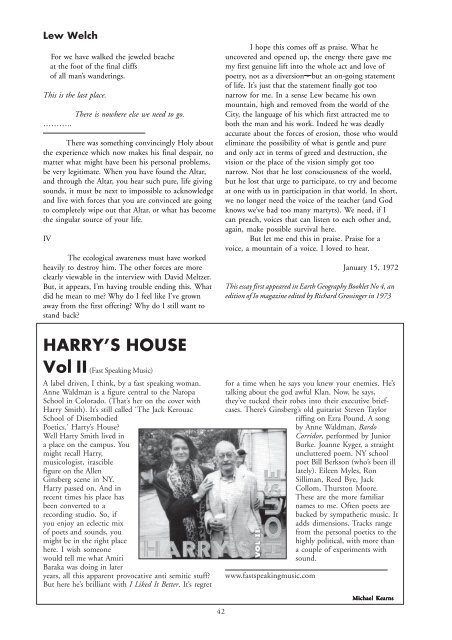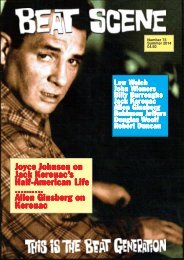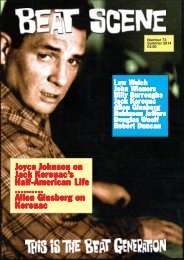Create successful ePaper yourself
Turn your PDF publications into a flip-book with our unique Google optimized e-Paper software.
Lew Welch<br />
For we have walked the jeweled beache<br />
at the foot of the final cliffs<br />
of all man’s wanderings.<br />
This is the last place.<br />
There is nowhere else we need to go.<br />
………..<br />
There was something convincingly Holy about<br />
the experience which now makes his final despair, no<br />
matter what might have been his personal problems,<br />
be very legitimate. When you have found the Altar,<br />
and through the Altar, you hear such pure, life giving<br />
sounds, it must be next to impossible to acknowledge<br />
and live with forces that you are convinced are going<br />
to completely wipe out that Altar, or what has become<br />
the singular source of your life.<br />
IV<br />
The ecological awareness must have worked<br />
heavily to destroy him. The other forces are more<br />
clearly viewable in the interview with David Meltzer.<br />
But, it appears, I’m having trouble ending this. What<br />
did he mean to me? Why do I feel like I’ve grown<br />
away from the first offering? Why do I still want to<br />
stand back?<br />
I hope this comes off as praise. What he<br />
uncovered and opened up, the energy there gave me<br />
my first genuine lift into the whole act and love of<br />
poetry, not as a diversion - but an on-going statement<br />
of life. It’s just that the statement finally got too<br />
narrow for me. In a sense Lew became his own<br />
mountain, high and removed from the world of the<br />
City, the language of his which first attracted me to<br />
both the man and his work. Indeed he was deadly<br />
accurate about the forces of erosion, those who would<br />
eliminate the possibility of what is gentle and pure<br />
and only act in terms of greed and destruction, the<br />
vision or the place of the vision simply got too<br />
narrow. Not that he lost consciousness of the world,<br />
but he lost that urge to participate, to try and become<br />
at one with us in participation in that world. In short,<br />
we no longer need the voice of the teacher (and God<br />
knows we’ve had too many martyrs). We need, if I<br />
can preach, voices that can listen to each other and,<br />
again, make possible survival here.<br />
But let me end this in praise. Praise for a<br />
voice, a mountain of a voice. I loved to hear.<br />
January 15, 1972<br />
This essay first appeared in Earth Geography Booklet No 4, an<br />
edition of Io magazine edited by Richard Grossinger in 1973<br />
HARRY’S HOUSE<br />
Vol II (Fast Speaking Music)<br />
A label driven, I think, by a fast speaking woman.<br />
Anne Waldman is a figure central to the Naropa<br />
School in Colorado. (That’s her on the cover with<br />
Harry Smith). It’s still called ‘The Jack Kerouac<br />
School of Disembodied<br />
Poetics.’ Harry’s House?<br />
Well Harry Smith lived in<br />
a place on the campus. You<br />
might recall Harry,<br />
musicologist, irascible<br />
figure on the Allen<br />
Ginsberg scene in NY.<br />
Harry passed on. And in<br />
recent times his place has<br />
been converted to a<br />
recording studio. So, if<br />
you enjoy an eclectic mix<br />
of poets and sounds, you<br />
might be in the right place<br />
here. I wish someone<br />
would tell me what Amiri<br />
Baraka was doing in later<br />
years, all this apparent provocative anti semitic stuff?<br />
But here he’s brilliant with I Liked It Better. It’s regret<br />
42<br />
for a time when he says you knew your enemies. He’s<br />
talking about the god awful Klan. Now, he says,<br />
they’ve tucked their robes into their executive briefcases.<br />
There’s Ginsberg’s old guitarist Steven Taylor<br />
riffing on Ezra Pound. A song<br />
by Anne Waldman, Bardo<br />
Corridor, performed by Junior<br />
Burke. Joanne Kyger, a straight<br />
uncluttered poem. NY school<br />
poet Bill Berkson (who’s been ill<br />
lately). Eileen Myles, Ron<br />
Silliman, Reed Bye, Jack<br />
Collom, Thurston Moore.<br />
These are the more familiar<br />
names to me. Often poets are<br />
backed by sympathetic music. It<br />
adds dimensions. Tracks range<br />
from the personal poetics to the<br />
highly political, with more than<br />
a couple of experiments with<br />
sound.<br />
www.fastspeakingmusic.com<br />
Michael Kearns





